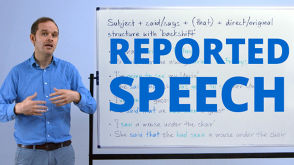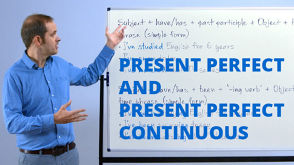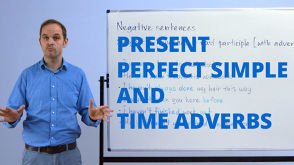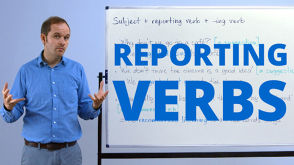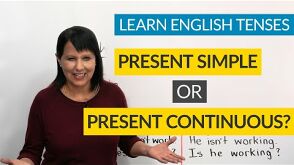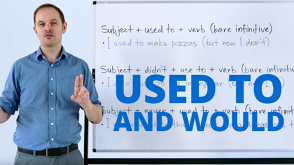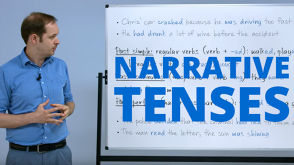Learn real English from movies and books.
Add words or phrases for learning and practice with other learners.
-
STEP 1Watch the video

-
STEP 2Do the exercises

-
STEP 3Add phrases you like to Favorites

Active and Passive
- 00:00 / 00:00
Click on a word or highlight a phrase to see translation
Click on a word or highlight a phrase to see translation
Click "plus" to add word/phrase for learning
Click "plus" to add word/phrase for learning
Start learning
Start learning
The passive voice
When we want to produce a sentence that focuses on the action more than the person or thing that does the activity or the ‘doer' is unknown or unimportant, we use the passive voice. The passive voice like the active voice can be formed in the present tenses, past tenses, and future tenses. There can sometimes be value in comparing the active voice with the passive.
The passive voice: Present simple and continuous
Form of the present simple passive:
Subject + ‘to be' + past participle + (by + object)
|
Present simple active sentence |
Present simple passive sentence |
Explanation |
|
A Japanese company makes these toys |
These toys are made by a Japanese company
|
The speaker wants to focus on the process of toys being made rather than the Japanese company that makes them |
|
The police arrest criminals |
Criminals are arrested |
The passive voice is used here because it is obvious/unimportant who the ‘doer' (the police) in this situation |
|
Holland makes cheese |
Cheese is made in Holland
|
We can use the passive voice in this way when we do not know, or do not care who did the activity |
Form of the present continuous passive:
Subject + is/are + being + past participle + (by + object)
|
Present continuous active sentence |
Present continuous passive sentence |
Explanation |
|
They are cooking food right now |
The food is being cooked
|
The passive voice is used here because the process, not the person doing the cooking, is more important for us. In both situations the speaker want to emphasis the process in the present so uses present continuous passive
|
|
Is anyone using this desk today? |
Is this desk being used today? |
The passive voice: Past simple and present perfect
Form of the past simple passive:
Subject + was/were + past participle + (by + object)
|
Past simple active sentence |
Past simple passive sentence |
Explanation |
|
Someone told us the meeting was 12pm |
We were told that the meeting was at 12pm |
Either the ‘doer' in this situation is unknown or unimportant so the passive voice is used |
|
I saw him at the train station |
He was seen at the train station |
|
Form of the present perfect simple passive:
Subject + have/has + been + past participle + (by + object)
|
Present perfect active sentence |
Present perfect passive sentence |
Explanation |
|
No has asked me about my birthday |
I have not been asked about my birthday |
The passive voice is used here to describe the fact the activity has not happened, the speaker is less interested in the people involved |
|
They have finished the project |
The project has been finished |
|
Future forms
Form of the ‘will' passive:
Subject + will/won't + be + past participle + (by + object)
|
‘will' active sentence |
‘will' passive sentence |
Explanation |
|
The company will pay the staff when job is completed |
Staff will be paid when the job is completed |
A common use of the passive voice is to only describe the activity because it is clear who is going to be doing the task, this sentence does this with an emphasis on the future |
|
The manager won't give interviews today |
Interviews won't be given by the manager today |
The speaker wants to put more emphasis on the activity, an activity that is not happening n this case, while the ‘doer' (the manager) is less important. |
Form of the ‘going to' passive:
Subject + ‘going to' + be + past participle + (be + object)
|
‘going to' active sentence |
‘going to' passive sentence |
Explanation |
|
Many people are going to visit Spain this year |
Spain is going to be visited this year |
In this situation is very clear who is going to visit Spain so the passive voice is used to focus on the activity of going which for this speaker is more important |
|
The president is going to give a speech about the situation tomorrow |
A speech about the situation is going to be given by the president |
The activity of the speech is of primary importance to the speaker in this situation. The ‘doer' (the president) is either obvious or less important |
Similar video exercises
Click on a word or highlight a phrase to see translation
Click on a word or highlight a phrase to see translation
Click "plus" to add word/phrase for learning
Click "plus" to add word/phrase for learning



